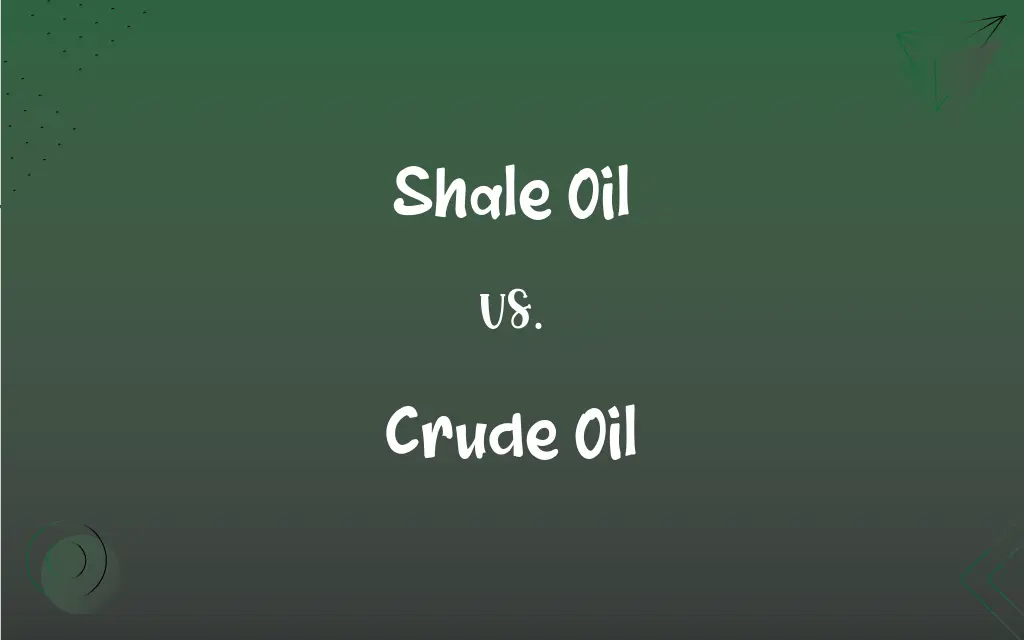Shale Oil vs. Crude Oil: What's the Difference?
Edited by Harlon Moss || By Janet White || Published on December 28, 2023
Shale oil is extracted from sedimentary rock formations using fracking, whereas crude oil is liquid petroleum pumped from underground reservoirs.

Key Differences
Shale oil, a type of unconventional oil, is found trapped within shale formations and requires hydraulic fracturing (fracking) for extraction. Crude oil, in contrast, is a naturally occurring, unrefined petroleum extracted from underground reservoirs, typically through drilling.
The production of shale oil involves horizontal drilling and fracking, which breaks the rock to release oil. Crude oil production, on the other hand, often utilizes traditional drilling methods, tapping into liquid-rich reservoirs where oil is more readily available.
Environmental impact differs significantly; shale oil extraction has been criticized for its potential to cause seismic activity and water contamination. Crude oil extraction, while also environmentally challenging, primarily faces issues related to oil spills and greenhouse gas emissions.
Economically, shale oil production can be more costly and less efficient due to the complex extraction process. Crude oil extraction, being more straightforward, often has lower production costs and higher efficiency.
The quality of shale oil can vary, sometimes requiring more refining than conventional crude oil, which is typically easier to process into gasoline, diesel, and other products.
ADVERTISEMENT
Comparison Chart
Extraction Method
Extracted from shale formations using fracking
Pumped from underground reservoirs
Environmental Impact
Potential for seismic activity, water issues
Oil spills, greenhouse gas emissions
Economic Efficiency
Higher costs, complex extraction
Lower costs, simpler extraction
Refining Requirements
May require more refining
Typically easier to process
Reservoir Type
Trapped in sedimentary rock
Found in liquid-rich underground reservoirs
ADVERTISEMENT
Shale Oil and Crude Oil Definitions
Shale Oil
Shale oil is a type of unconventional oil extracted from shale deposits.
Shale oil production has surged in recent years, impacting global oil markets.
Crude Oil
Crude oil, a mixture of hydrocarbons, is extracted through drilling.
Offshore drilling platforms are common sites for crude oil extraction.
Shale Oil
Shale oil refers to hydrocarbons that are trapped within shale formations.
Advancements in technology have made shale oil a viable energy source.
Crude Oil
Crude oil is a natural, unrefined petroleum substance.
Crude oil is transported to refineries for processing into various fuels.
Shale Oil
Shale oil is oil obtained from breaking down shale rock.
The company specializes in extracting shale oil from deep underground formations.
Crude Oil
Crude oil refers to liquid petroleum extracted from underground.
The country's economy heavily relies on its crude oil exports.
Shale Oil
Shale oil, often found in fine-grained sedimentary rock, requires advanced extraction methods.
The region's economy boomed due to its rich shale oil reserves.
Crude Oil
Crude oil is the raw form of petroleum before refining.
Refineries turn crude oil into gasoline, diesel, and other products.
Shale Oil
Shale oil is a fossil fuel derived from shale rock through hydraulic fracturing.
Environmental concerns have grown around the extraction of shale oil.
Crude Oil
Crude oil is a fossil fuel used as a primary energy source worldwide.
Fluctuations in crude oil prices can significantly impact global markets.
FAQs
What is crude oil?
Crude oil is a natural, unrefined petroleum substance extracted from underground reservoirs.
What is shale oil?
Shale oil is a type of unconventional oil extracted from shale rock formations.
Are shale oil and crude oil the same?
No, they differ in their extraction methods and properties; shale oil is from shale formations, while crude oil is from liquid reservoirs.
Which has a greater environmental impact?
Both have significant impacts; shale oil extraction has potential seismic and water contamination risks, while crude oil extraction risks include oil spills and emissions.
Is shale oil production more expensive?
Yes, generally, due to its complex extraction process.
How is crude oil extracted?
Crude oil is typically extracted through drilling into underground reservoirs.
What are the main uses of shale oil?
Shale oil is primarily used for fuel, like gasoline and diesel, after refining.
How is shale oil extracted?
Shale oil is extracted using hydraulic fracturing, or fracking, which involves breaking the shale rock to release oil.
Are the prices of shale oil and crude oil the same?
Prices can vary based on extraction costs, quality, and market demand.
Does shale oil require more refining?
Shale oil may need more refining than crude oil, depending on its quality.
What are the main uses of crude oil?
Crude oil is processed into various fuels, including gasoline, diesel, and jet fuel, as well as into chemicals and plastics.
Are there geographical differences in the availability of shale oil and crude oil?
Yes, shale oil and crude oil are found in different regions based on geological formations.
Can shale oil be a substitute for crude oil?
Shale oil serves as an alternative source, but it cannot completely replace crude oil due to different characteristics and extraction methods.
Which is more common, shale oil or crude oil?
Crude oil is more common and widely used globally compared to shale oil.
How does the quality of shale oil compare to crude oil?
Shale oil quality can vary and sometimes requires more refining compared to crude oil.
Does the production of shale oil affect crude oil prices?
Yes, increased shale oil production can influence global crude oil prices and market dynamics.
Are there future prospects for shale oil?
The future of shale oil depends on technological advances, environmental regulations, and market conditions.
Is shale oil extraction growing globally?
Yes, especially in countries like the USA, due to advancements in extraction technology.
What are the challenges in shale oil production?
Challenges include environmental concerns, higher production costs, and technical complexities in extraction.
How do the energy contents compare?
The energy content can vary, but generally, crude oil has a higher energy density than shale oil.
About Author
Written by
Janet WhiteJanet White has been an esteemed writer and blogger for Difference Wiki. Holding a Master's degree in Science and Medical Journalism from the prestigious Boston University, she has consistently demonstrated her expertise and passion for her field. When she's not immersed in her work, Janet relishes her time exercising, delving into a good book, and cherishing moments with friends and family.
Edited by
Harlon MossHarlon is a seasoned quality moderator and accomplished content writer for Difference Wiki. An alumnus of the prestigious University of California, he earned his degree in Computer Science. Leveraging his academic background, Harlon brings a meticulous and informed perspective to his work, ensuring content accuracy and excellence.






































































